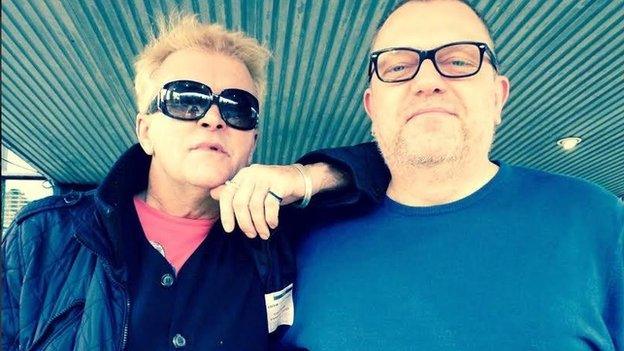Steve Strange: The custodian of New Romantic pop
- Published
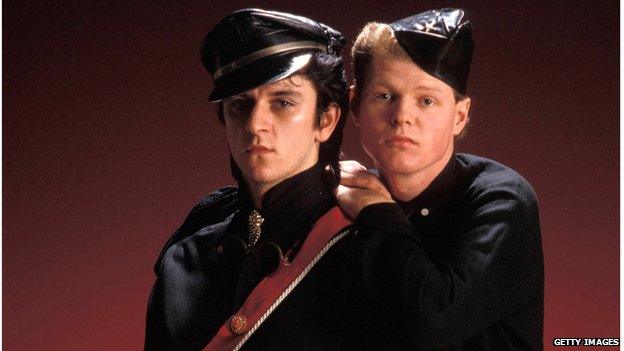
Steve Strange (left) and Rusty Egan helped establish the aesthetic of the 1980s
Visage were never the most popular or successful band of the New Romantic era - but Steve Strange, who has died at the age of 55, was the movement's head boy.
He ran the most sought-after clubs in London - Billy's, Blitz and the Camden Palace, booking the likes of Spandau Ballet and Culture Club at the start of their careers.
Their colour and flamboyance was an antidote to the scorched-earth policy of punk, and it set the tone for the rest of the '80s.
For all its notoriety, it is easy to forget that Blitz was a weekly club night in a shabby wine bar off Covent Garden. What set it apart was the clientele, and what set the clientele apart was Steve Strange's rigorous door policy. Outrage guaranteed entry.
Inside, the club was a gallery of spiky hair, frilly shirts, killer heels and garish smudges of lipstick and blusher. And that was just the boys.
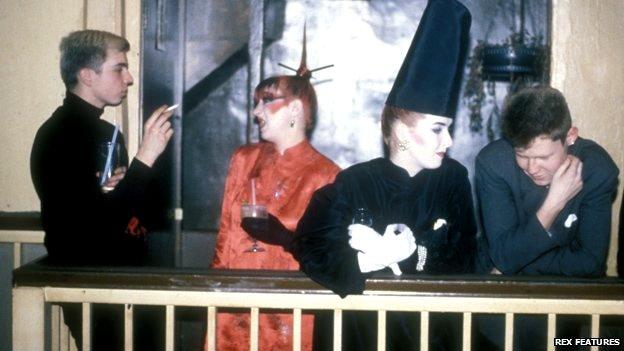
The Blitz Club was a blast of colour in the drab landscape of 1980s London
"Steve's door policy was fantastic," recalls Midge Ure, who played alongside Strange in Visage. "He wouldn't let in anyone he didn't like the look of.
"So he famously turned away Mick Jagger because he thought he was too rock and roll. But when David Bowie turned up, all these cool kids suddenly went into turmoil and meltdown because the king had appeared."
Strange told The Independent, external in 2000: "I remember David Bowie coming to the club because he had heard how bizarre it was. I would stand on the door and I was so strict.
"If people turned up in a wetsuit with their face painted black and white I would say: 'Sorry you can't come in.' It wasn't about that.
"It was about showing your creative side, and about showing that you'd taken time and effort in what you had created. It was about classic style and being outrageous, but done with an element of taste.''
Vibrant
Born Steven Harrington in Newbridge, Caerphilly, Strange had a turbulent childhood. His parents ran seaside cafes and guests houses, but his mother was left broke after walking out on the family. His father later killed himself after learning he had a brain tumour.
Strange was suspended from school at the age of 13 when he turned up in punk attire - orange hair with a chain through his nose. He soon left Wales for London and took a job designing artwork for Malcolm McLaren and The Sex Pistols.
It was there that he met Rusty Egan, drummer in new wave band The Rich Kids. They became flatmates and, soon after, established their first club night.
Billy's was a tacky gay dive in Soho, which struggled to attract customers on a Tuesday night. "I'll fill it for you," said Egan, and set up a Bowie-inspired night, printing flyers that declared "fame fame fame" to lure acolytes of the Thin White Duke.
Strange worked the door, giving preferential treatment to anyone dressed in the velvet suits and hippy frills found in the flamboyant PX store on James Street - where, coincidentally, he was employed as a shop assistant.
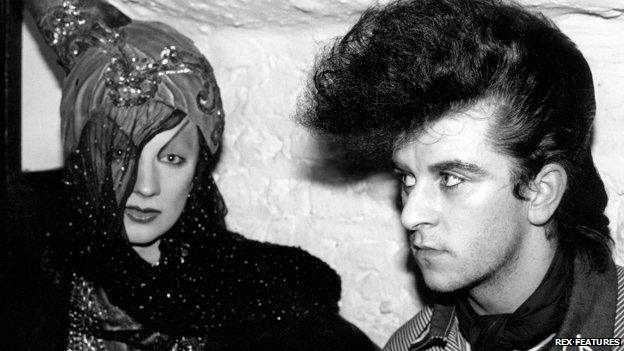
Boy George was a cloakroom attendant at Blitz before finding success with Culture Club
It attracted the likes of Boy George, Gary Kemp, Midge Ure and Marilyn - a roll call of the New Romantic era. But things stepped up a gear when they moved to the Blitz Club.
"[Steve] and Rusty created a movement in London," recalled Midge Ure.
"The Blitz and the subsequent 'Blitz kids' grew into a massive movement in the UK associated with fashion and image and photography.
"You could stand in the Blitz club and look around you and there'd be future journalists and film-makers and writers and musicians, and a young Boy George taking coats at the coat check.
"There was something really vibrant about that, and they were responsible for that."
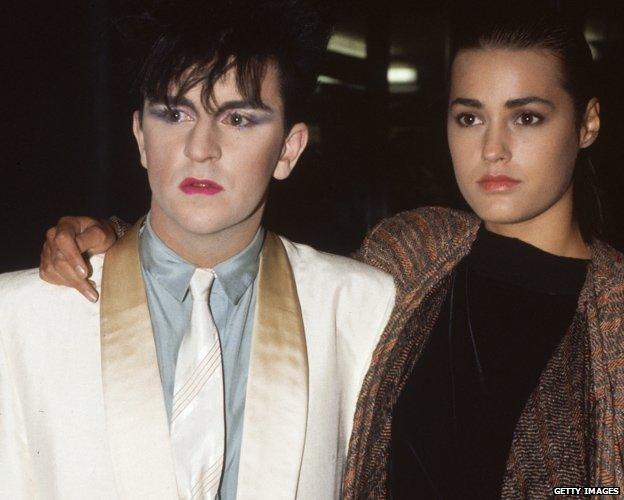
Strange mixed with the A-list of 1980s pop and fashion, including Simon Le Bon's future wife Yasmin
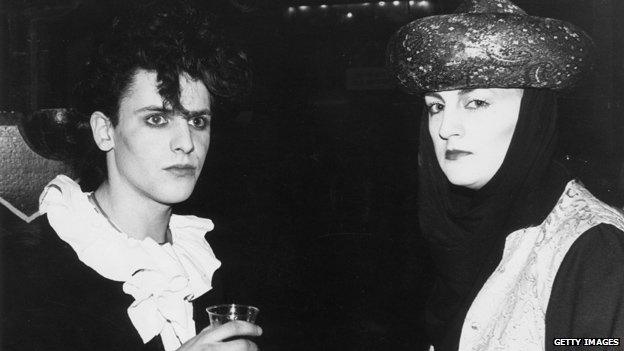
The Blitz Club was succeeded by Camden Palace and other club nights
Strange himself was overwhelmed by the club's success.
"It was totally amazing. Myself and Rusty, we certainly didn't think what we were creating was going to turn into a movement and go into history books," he said.
"We were creating this new music scene, but also we were changing the face of clubland."
Addiction
Meanwhile, Strange had become a pop star in his own right.
Visage's biggest hit was Fade to Grey
Visage began in late 1978, when Ure and Strange recorded a cover of the old Zager and Evans' hit In The Year 2525.
Their demo was turned down by EMI Records, but the duo kept recruiting musicians - poaching Dave Formula (keyboards), John McGeogh (guitar) and Barry Adamson (bass) from the band Magazine.
Tar, their debut single, eulogised the joys of smoking; but it was the icy, teutonic Fade To Grey that became their signature hit, reaching number eight in 1980.
But their success was short-lived. The band all had other commitments and, after their first two albums, fractures started to appear.
''It wasn't enjoyable going into the studio," Strange later recalled. "It was more like hell."
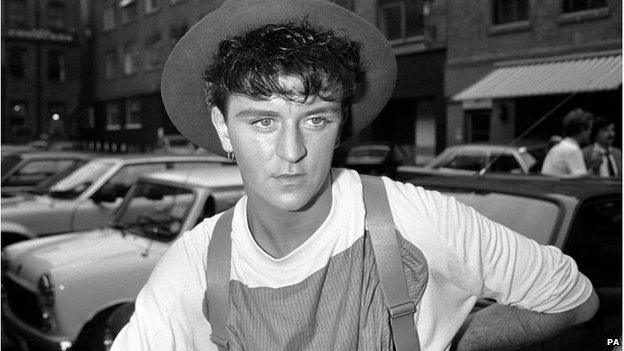
Fade To Grey gave Visage a number one hit in both Germany and Switzerland
By the time the band fizzled out, Strange had spiralled into heroin addiction.
"It was just the pressure of work," he told the BBC. "My schedule meant I'd have to be in three countries in one day doing promotion for Visage and I was trying to run the Camden Palace at the same time.
"At first I was using cocaine just to keep me going. I was always anti-heroin but I remember I was modelling for Jean Paul Gaultier and at the after show party I was offered heroin and that was the start of the slide."
He managed to kick the habit and by the mid-'80s was a successful DJ, earning £3,500 a night and hosting parties for the likes of Sylvester Stallone.
In the early 1990s, he was the host at the Double Bass, which was voted nightclub of the year twice in a row.
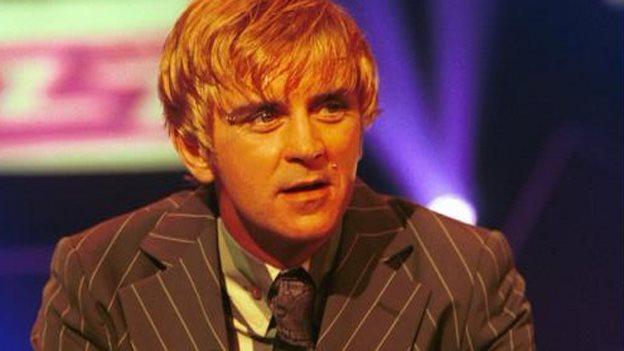
In later years, Strange was a respected pop culture commentator
However, his world crashed again when his "very, very dear friend" Michael Hutchence died in 1997 and, the following day, his London home burnt down.
He retreated to Wales, where he suffered a nervous breakdown. It was at this point he was arrested for stealing a £10.99 Tellytubby doll and given a three-month suspended sentence.
At the hearing, his solicitor said: "My client has found it difficult to cope with falling from grace after being a man of considerable wealth."
But after seeking treatment, Strange got back on his feet and revived Visage, releasing a new album, Hearts and Knives, in May 2013. The band also recorded a new classical interpretation of Fade To Grey last year.
To the end, he was philosophical about the ups and downs of his career, telling the BBC: "I can't cry about it. I got to see the world and educate myself and I can still do that. Other people are my education. As long as I'm around creative people, I'm fine."
- Published13 February 2015
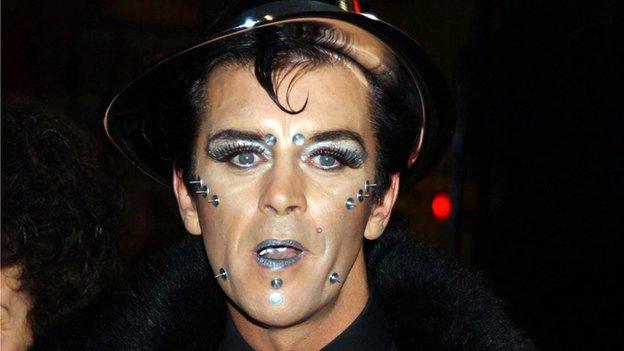
- Published13 February 2015
- Published3 December 2014
